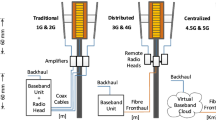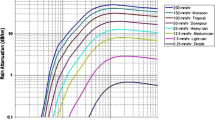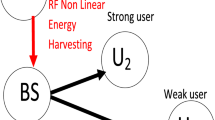Abstract
Hybrid precoding is an emerging solution for millimeter wave massive MIMO system to achieve reduced complexity and enhanced spectral efficiency. Hybrid precoding fully exploits spatial information to achieve high channel gain which reduces excessive path loss. The research presented in this paper is aiming at the design of optimal precoder which is based on Logarithmic hyperbolic cosine cost function with ZA and RZA criterion and has the advantage of reduced RF Chains. The channel state information (CSI) is generated by using random values of angle of arrival (AoA) and angle of departure (AoD) information. This CSI information is crucial to generate the precoding matrices and the row wise elements of the digital precoding matrix are recursively updated by using hyperbolic cosine filtering algorithm. Proposed precoder achieves spectral efficiency of 13 bps/Hz with 20 dB SNR which is comparatively higher than the precoders designed using other state of art methods. The performance is tested by varying base station antennas, mobile station antennas and number of users. The achievable spectral efficiency with variation of antenna elements and users establish the superior performance of the precoder. Thus the design can be suitable for fifth and next generation wireless communication systems when higher data rate is the requirement in millimeter wave band.








Similar content being viewed by others
References
Wang, X., Kong, L., et al. (2018). Millimeter wave communication: A comprehensive survey. IEEE Communications Surveys & Tutorials, 20(3), 1616–1653.
Xiao, M., et al. (2017). Millimeter wave communications for future mobile networks. IEEE Journal on Selected Areas in Communications., 35(9), 1909–1935.
Rappaport, T. S., et al. (2013). Millimeter wave mobile communications for 5G cellular: It will work! IEEE access, 1, 335–349.
Zhou, J. (2021). Downlink channel estimation for millimeter wave communication combining low-rank and sparse structure characteristics. Annnal of Telecommun., 76(1), 53–62.
A. Ali, Y. Zhu, and M. Zakarya(2021). A data aggregation based approach to exploit dynamic spatio-temporal correlations for citywide crowd flows prediction in fog computing.Multimedia Tools and Applications, 1–33.
Ali, A., Zhu, Y., & Zakarya, M. (2021). Exploiting dynamic spatio-temporal correlations for citywide traffic flow prediction using attention based neural networks. Information sciences, 577, 852–870.
Ali, A., Zhu, Y., & Zakarya, M. (2022). Exploiting dynamic spatio-temporal graph convolutional neural networks for citywide traffic flows prediction. Neural networks, 145, 233–247.
Osama, I., Rihan, M., Elhefnawy, M., Eldolil, S., & Malhat, H.A.E.-A. (2022). A review on precoding techniques for mm-wave massive MIMO wireless systems. International Journal of Communication Networks and Information Security, 14(1), 26–36.
G. N. Reddy, C. V Ravikumar, and A. Rajesh (2022). Literature review and research direction towards channel estimation and hybrid pre-coding in mmWave massive MIMO communication systems. Journal of Reliable Intelligent Environments, 1–20.
Liu, X., & Zou, W. (2018). Block-sparse hybrid precoding and limited feedback for millimeter wave massive MIMO systems. Physical Communication, 26, 81–86.
Sahoo, S., Sahoo, H. K., & Nanda, S. (2022). Energy efficient equalizer design for MIMO OFDM communication systems using improved split complex extreme learning machine. Signal, Image Video Processing, 16(2), 349–357.
Sarkar, M., Sahoo, S., & Nanda, S. (2022). Channel estimation of non-orthogonal multiple access systems based on L2-norm extreme learning machine. Signal, Image Video Processing, 16(4), 921–929.
El Ayach, O., Rajagopal, S., Abu-Surra, S., Pi, Z., & Heath, R. W. (2014). Spatially sparse precoding in millimeter wave MIMO systems. IEEE Transaction on Wireless Communication, 13(3), 1499–1513.
Ni, W., & Dong, X. (2015). Hybrid block diagonalization for massive multiuser MIMO systems. IEEE Transaction on Wireless Communication, 64(1), 201–211.
Spencer, Q. H., Swindlehurst, A. L., & Haardt, M. (2004). Zero-forcing methods for downlink spatial multiplexing in multiuser MIMO channels. IEEE Transaction on signal Processing, 52(2), 461–471.
Nguyen, D. H. N., Le, L. B., Le-Ngoc, T., & Heath, R. W. (2017). Hybrid MMSE precoding and combining designs for mmWave multiuser systems. IEEE Access, 5, 19167–19181.
Jian, R., Chen, Y., Liu, Z., & Xia, Y. (2020). Hybrid precoding for multiuser massive MIMO systems based on MMSE-PSO. Wireless Networks, 26, 1291–1299.
Liu, F., Kan, X., Bai, X., Du, R., Liu, H., & Zhang, Y. (2020). Hybrid precoding based on adaptive RF-chain-to-antenna connection for millimeter wave MIMO systems. Physical Communication, 39, 100997.
Yu, X., Shen, J.-C., Zhang, J., & Letaief, K. B. (2016). Alternating minimization algorithms for hybrid precoding in millimeter wave MIMO systems. IEEE Journal of Selected Topics in Signal Processing, 10(3), 485–500.
Wang, S., Li, L., Ruby, R., & Li, P. (2020). A general hybrid precoding scheme for millimeter wave massive MIMO systems. Wireless Networks, 26, 1331–1345.
Ahn, Y., Kim, T., & Lee, C. (2017). A beam steering based hybrid precoding for MU-MIMO mmWave systems. IEEE Communication Letter, 21, 2726–2729.
Alkhateeb, A., Leus, G., & Heath, R. W. (2015). Limited feedback hybrid precoding for multi-user millimeter wave systems. IEEE Transaction on Wireless Communication., 14, 6481–6494.
Zhao, L., Ng, D. W. K., & Yuan, J. (2017). Multi-user precoding and channel estimation for hybrid millimeter wave systems. IEEE Journal on Selected areas Communication., 35(7), 1576–1590.
Hu, C., Liu, J., Liao, X., Liu, Y., & Wang, J. (2017). A novel equivalent baseband channel of hybrid beamforming in massive multiuser MIMO systems. IEEE Communication letter, 22(4), 764–767.
Vizziello, A., Savazzi, P., & Chowdhury, K. R. (2018). A Kalman based hybrid precoding for multi-user millimeter wave MIMO systems. IEEE Access, 6, 55712–55722.
Elbir, A. M., & Papazafeiropoulos, A. K. (2020). Hybrid precoding for multiuser millimeter wave massive MIMO systems: A deep learning approach. IEEE Transaction on Vehicular Technology, 69(1), 552–563.
M. Alouzi, F. Al-Kamali, C. D’amours, and F. Chan (2023). Direct Conversion of Hybrid Precoding and Combining from Full Array Architecture to Subarray Architecture for mmWave MIMO Systems. IEEE Access.
Huang, S., Ye, Y., & Xiao, M. (2021). Learning based hybrid beamforming design for full-duplex millimeter wave systems. IEEE Transactions on Cognitive Communications and Networking, 7(1), 120–132.
Huang, H., Song, Y., Yang, J., Gui, G., & Adachi, F. (2019). Deep-learning-based millimeter-wave massive MIMO for hybrid precoding. IEEE Transactions on Vehicular Technology, 68(3), 3027–3032.
B. Q. Vuong, H. T. Huynh, and H. N. Do, (2018). Monte-carlo performance analysis of OFDM system in the presence of multi-path fading environment and non-Gaussian noise. in 2018 2nd International Conference on Recent Advances in Signal Processing, Telecommunications \& Computing (SigTelCom), 230–235.
Mulla, M., Rizaner, A., & Ulusoy, A. H. (2022). Fuzzy logic based decoder for single-user millimeter wave systems under impulsive noise. Wireless Personal Communication, 124(2), 1883–1895.
Kumar, K., Bhattacharjee, S. S., & George, N. V. (2020). Joint logarithmic hyperbolic cosine robust sparse adaptive algorithms. IEEE Transaction Circuits System II Express Briefs, 68(1), 526–530.
Li, M., Liu, W., Tian, X., Wang, Z., & Liu, Q. (2019). Iterative hybrid precoder and combiner design for mmWave MIMO-OFDM systems. Wireless Networks, 25, 4829–4837.
D. H. N. Nguyen, L. B. Le, and T. Le-Ngoc, (2016). Hybrid MMSE precoding for mmWave multiuser MIMO systems. In 2016 IEEE international conference on communications (ICC), 1–6.
L.-F. Lin, W.-H. Chung, H.-J. Chen, and T.-S. Lee. Energy efficient hybrid precoding for multi-user massive MIMO systems using low-resolution ADCs. In 2016 IEEE International Workshop on Signal Processing Systems (SiPS), 115–120.
Wang, J., et al. (2009). Beam codebook based beamforming protocol for multi-Gbps millimeter-wave WPAN systems. IEEE Journal Selection Areas Commun., 27(8), 1390–1399.
Hur, S., Kim, T., Love, D. J., Krogmeier, J. V., Thomas, T. A., & Ghosh, A. (2013). Millimeter wave beamforming for wireless backhaul and access in small cell networks. IEEE Transactions on Communication, 61(10), 4391–4403.
Liu, C., & Jiang, M. (2020). Robust adaptive filter with lncosh cost. Signal Processing, 168, 107348.
Acknowledgements
Authors acknowledge the support from KIIT Bhubaneswar and VSSUT Burla in terms of journals and laboratory facilities.
Author information
Authors and Affiliations
Corresponding author
Ethics declarations
Conflict of interest
The authors claim that they have no known competing financial interests or personal relationships that could have appeared to influence the work reported in this paper.
Additional information
Publisher's Note
Springer Nature remains neutral with regard to jurisdictional claims in published maps and institutional affiliations.
Rights and permissions
Springer Nature or its licensor (e.g. a society or other partner) holds exclusive rights to this article under a publishing agreement with the author(s) or other rightsholder(s); author self-archiving of the accepted manuscript version of this article is solely governed by the terms of such publishing agreement and applicable law.
About this article
Cite this article
Sahoo, S., Sarkar, M., Sahoo, H.K. et al. Multiuser hybrid precoder design using logarithmic hyperbolic filtering for millimeter wave communication systems. Wireless Netw 30, 139–150 (2024). https://doi.org/10.1007/s11276-023-03465-8
Accepted:
Published:
Issue Date:
DOI: https://doi.org/10.1007/s11276-023-03465-8




